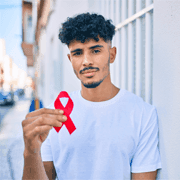Gynecomastia and Sexual Health: What is it + Solutions
In This Article
Gynecomastia and Sexual Health: What is it + Solutions
Alex
Updated on October 31, 2023
Medically verified by Dr. Arya
Fact checked by Dr. Sharon

Wellness
9 min read
Picture this: you're at the beach, soaking in the warmth of the sun, and listening to the soothing waves. Sounds like paradise, right? But when you remove your shirt, you can't help but feel self conscious.
The reason? Gynecomastia. It is a condition that affects people of all ages. Gynecomastia can affect your appearance and leave you thinking about your body image.
Understanding Gynecomastia
Gynecomastia, that's quite a mouthful isn't it?
But don't worry the name may sound intimidating. However, many men experience this situation at some point.
What is gynecomastia?
Gynecomastia is the growth of breast tissue in males. Yes you heard that correctly.
Men can develop breasts too!. Before you start panicking, rest assured that this is usually nothing to be overly worried about.
In fact it often occurs as a part of growing up.
What Causes Gynecomastia?
Gynecomastia can happen for different reasons. It's crucial to keep in mind that every situation is unique. Several typical causes of its occurrence are listed below:
1. Hormonal Imbalances - During puberty hormonal fluctuations can happen. Gynecomastia can result from an imbalance of testosterone and oestrogen.
2. Medications - Gynecomastia can happen as a side effect from several drugs, especially those for depression and heart issues.
3. Lifestyle Factors - Alcohol consumption and the use of drugs can cause the development of gynecomastia.
4. Medical Conditions - Underlying medical conditions like liver or kidney disease have been associated with gynecomastia.
5. Aging Process - As individuals age, their bodies undergo changes and gynecomastia can be a part of the ageing process.
Gynecomastia and Sexual Health
Your sexual health and gynecomastia are somewhat related. You might be asking yourself, "How does having man boobs' impact my sex life?"
Gynecomastia and sexual health actually have a more nuanced relationship than first appears.
There may be an emotional reaction when a man begins to develop breast tissue. You could worry about your appearance and feel self-conscious.
Your sexual health may be affected by these emotional impacts. It could lead to performance anxiety, decrease your libido, or interfere with private times.
Physical discomfort is a potential side effect of gynecomastia. What should be joyful moments become unpleasant ones due to tenderness and occasionally pain in the chest area.
Effects of Gynecomastia on Sexual Health
| Psychological and Emotional Impact | Impact on Sexual Activities | Physical Discomfort |
|---|---|---|
| Self-consciousness | Performance anxiety | Breast tenderness |
| Lower self-esteem | Reduced desire for sexual activities | Pain in the breast area |
| Anxiety about physical appearance | Reduced enjoyment during sexual activities |
Solutions for Gynecomastia
There are ways to control and treat gynecomastia. You can take some steps, such as:
Diet and Exercise:
If you're dealing with gynecomastia due to excess body fat, there are lifestyle changes you can consider:
1. Dietary Adjustments:
- Opt for a balanced diet enriched with nutritious choices like fruits, veggies, and whole grains. This shift can help you shed that extra fat and improve the appearance of your chest.
- Incorporate physical activities into your routine, such as jogging, brisk walks, or weightlifting. These activities aid in fat reduction and muscle building.
It's essential to understand that these lifestyle alterations may not be effective for everyone, particularly if your gynecomastia stems from hormonal or glandular issues.
2. Medicinal Options:
If you're seeking medical solutions, your doctor may recommend specific medications for treating gynecomastia:
-
Selected Oestrogen Receptor Modulators (SERMs):
- SERMs can counteract the impact of oestrogen on your chest area. These medications prove beneficial if hormonal imbalances cause your gynecomastia.
-
Aromatase Inhibitors:
- Medications like anastrozole work to reduce the oestrogen produced in your body.
Remember, it's crucial to consult with your healthcare provider to determine the most suitable approach for your unique situation.
Surgical Interventions
If lifestyle changes and medication don't work or if you have a severe case of gynecomastia, surgery might be an option. There are two main surgeries:
1. Liposuction Explained:
Liposuction, often considered a minor surgical procedure, aims to remove excess chest fat in cases where gynecomastia results primarily from this fat buildup. The process involves the skillful hands of a surgeon making small incisions and employing a thin tube to carefully extract the surplus fat.
Interestingly, the recovery period following liposuction tends to be relatively swift when compared to more extensive surgeries. Remarkably, most individuals find themselves back to their usual routines within a few weeks.
2. Understanding Mastectomy:
In instances of severe gynecomastia or when an abundance of glandular tissue is involved, medical professionals may recommend a mastectomy. This particular surgical procedure not only eliminates the excessive breast tissue but also artfully reshapes the chest. It's noteworthy that a mastectomy constitutes a more extensive surgical intervention, which naturally translates into a more extended recovery phase.
It is important to note that there are several different kinds of mastectomies, your surgeon will be helping you choose the one that best suits your condition.
 7 min read
7 min readPhysical Fitness and Sexual Health: How Exercise Boosts Your Sexual Life
 7 min read
7 min readSexually Transmitted Diseases: Types, Symptoms, Treatment
 14 min read
14 min readHow to Avoid Pregnancy After Sex
Book Your Consultation Now
Hormone Therapy for Gynecomastia
Hormonal imbalances could be the reason behind gynecomastia. Hormone therapy is about getting those testosterone and oestrogen levels in check, like a delicate balancing act. How do they do it, you ask? With medication, of course. Some medications like TRT pump up the testosterone, while others bring down the oestrogen.
Now, when is this hormone therapy recommended, you wonder? Usually when everything else has failed, or when gynecomastia becomes severe. But here's the twist, you better keep that line of communication open with your doctor. They'll be your guide as this therapy needs some real-time monitoring.
Here's a friendly reminder: don't forget to have that talk with your doctor about treatment options. Yes, you can take charge of gynecomastia, and with the right guidance, you might just find that boost of confidence in your own skin.
Your primary care doctor could recommend a number of diagnostic tests to identify the exact cause of your gynecomastia and to treat the underlying problem. But treating the underlying issue won't necessarily make the overdeveloped male breasts less noticeable.
At Mykare Health, we can help you get connected with the best of the doctors.
Preventing Gynecomastia
Now that we've delved into the realm of gynecomastia, exploring its nature and strategies to address it, let's dive into the proactive measures to hinder its onset or minimise the risk. It's crucial to bear in mind that while absolute prevention isn't always attainable, adopting certain practices can reduce its likelihood.
1. Maintain a Healthy Weight: Among the lifestyle factors associated with gynecomastia, excess body fat plays a significant role. Uphold your weight within the recommended range by engaging in regular exercise and consuming nourishing foods. Incorporating a variety of activities, such as brisk running and weightlifting, can assist in keeping your body fat levels in check.
2. Exercise Alcohol Moderation: Excessive alcohol consumption can disrupt hormonal balance, heightening the susceptibility to gynecomastia. If you indulge in alcohol, aim not to exceed two drinks per day.
3. Reject Illicit Substances: Certain recreational drugs, like marijuana or steroids, possess the potential to induce gynecomastia. It's prudent to steer clear of these substances altogether.
4. Address Stress: Prolonged stress can adversely impact hormone regulation, potentially elevating the risk of gynecomastia. Consider relaxation techniques such as meditation, yoga, or simply allocating time for unwinding to mitigate stress.
5. Review Medications: If you're taking medications that could trigger gynecomastia, initiate a conversation with your healthcare provider. They might explore alternatives or adjustments to your prescription regimen.
6. Stay Well-Informed: Maintain vigilance concerning the substances you ingest, including over-the-counter medicines. Scrutinise labels, seek clarification, and engage in discussions with your healthcare provider if any concerns arise.
Detecting Issues Early
1. Monitor Changes: In parallel to how women are advised to perform breast self-examinations, men should exhibit awareness of their chest area and diligently monitor for any alterations. While gynecomastia is typically benign, vigilance is commendable. If peculiar lumps, discomfort, or swelling manifest, promptly consult your healthcare provider.
2. Regular Medical Checkups: Consistently schedule appointments with your doctor for routine checkups. This facilitates the detection of underlying medical conditions that might predispose you to gynecomastia. Be candid with your physician regarding any bodily transformations or concerns.
3. Hormone Oversight: Keep a watchful eye on your hormone levels. If you suspect hormonal imbalances as a contributor to gynecomastia, seek the expertise of a hormone specialist. They can conduct hormone assessments and propose tailored interventions if necessary.
4. Knowledge Empowers: Acquaint yourself with gynecomastia and its risk factors. This knowledge empowers you to make informed choices and initiate discussions with your healthcare provider during appointments.
5. Family History Matters: If gynecomastia or breast cancer runs in your family, relay this information to your healthcare provider. It aids them in gauging your risk and formulating preventative strategies.
Ultimately, while absolute prevention of gynecomastia may remain elusive, cultivating a health-conscious lifestyle and remaining vigilant to changes can substantially diminish the odds. Remember that your well-being and self-assurance are invaluable. Taking steps toward better health can enhance your overall quality of life and your self-esteem.
Seeking Professional Advice
Remember, if you're dealing with gynecomastia and it's causing you distress or impacting your sexual health, it's essential to seek professional advice. Your doctor can help determine the underlying cause and recommend the most appropriate treatment options for your specific situation.
The Emotional Journey
When it comes to confronting gynecomastia, it's not just a straightforward physical journey; it's an emotional journey as well. You might find yourself oscillating between self-consciousness and persistent worries regarding the judgments. But remember your value extends far beyond how you look.
Gynecomastia means guys can develop breast tissue, and it's not uncommon.
It can happen due to hormone imbalances, medications, lifestyle choices, health problems, or just getting older.
Gynecomastia might make you feel self-conscious and affect how you see yourself.
These feelings can indirectly affect your sexual confidence and desire.
Lifestyle changes like staying a healthy weight and watching alcohol intake can help reduce the risk.
Medications, hormone therapy, or surgery are options depending on how bad it is.
Always talk to a doctor to decide on the right treatment.
Making wise lifestyle changes plays a vital role in decreasing the likelihood of gynecomastia.
Gynecomastia affects both how you look and how you feel.



